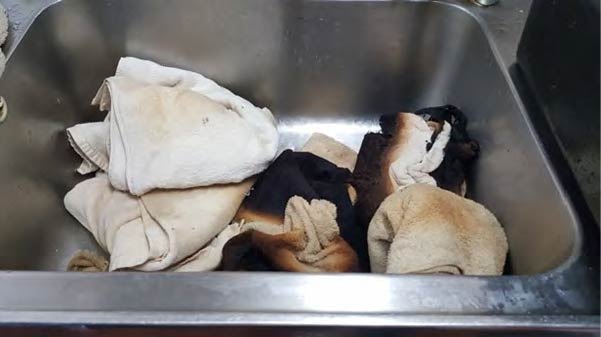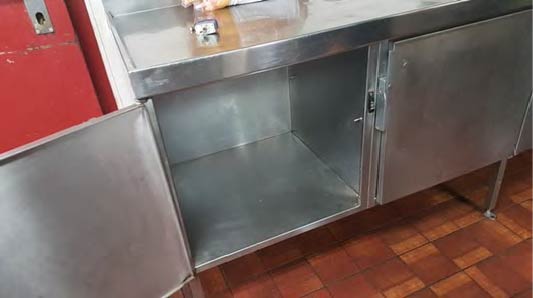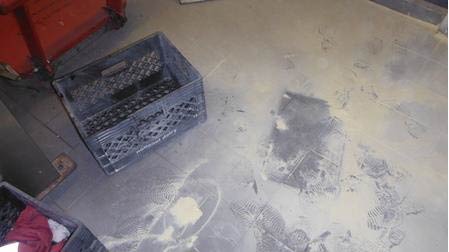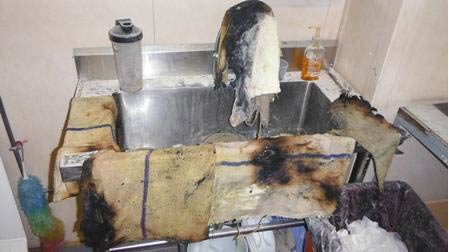Fire: Spontaneous combustion of towels
Two members have reported incidents in which there were fires in the laundry arising from the spontaneous combustion of galley towels removed from the tumble dryer.
Incident 1
The galley crew decided to wash & dry dirty, greasy towels. As soon as the laundry was removed from tumble dryer, it was folded and placed inside a stainless steel cupboard in the galley area. A few minutes later, smoke was noted coming from the cupboard. When the door was opened, the towels were found to be on fire due to self-combustion. The fire was rapidly extinguished with no injuries or further damage sustained.
Spontaneous combustion occurs when a flammable or combustible substance (in this case, the oil or grease in the towels) is slowly heated to its ignition point through oxidation, and many substances will begin to release heat as they oxidise. In this incident, the process was sped up through heating in the tumble dryer. If the heat has no way to escape (such as with a pile of laundry within a closed cupboard) the temperature will raise to a level high enough to ignite the oil and cause a fire in the laundry.


Our member took the following actions:
- Galley staff briefed on laundry procedures
- all laundry clothes should be checked prior to washing and tumble drying
- greasy cloths covered in vegetable or animal oils should not be dried at high temperatures;
- Implemented daily toolbox talks specifically related to daily tasks for catering team;
- Ensured that the sub-contractor providing galley staff was advised of the incident and was asked to brief all employees on these hazards.
Main lessons learnt:
- Care should be taken to organise and separate different items for laundry;
- Wash thoroughly on hot cycle – using a hot water cycle to clean oily laundry will help remove the substances more efficiently than a cold or ‘warm’ cycle;
- Dry at proper temperatures – drying laundry at too high a temperature can greatly increase the risk of spontaneous combustion. Any residues that are left over after the wash cycle will be at a much greater risk of ignition if the dryer temperature is too high;
- Laundry should be stored in well ventilated areas; keeping the laundry room cool is important. By keeping air flow in the room, the temperature will stay lower and reduce the risk of laundry getting overheated;
- Laundry should not be folded and put away whilst still hot from the dryer – allow it to air and cool down;
- Of particular high risk are the animal and vegetable oils commonly used in the galley.
Incident 2
Burning towels were discovered in a laundry room on an offshore vessel. Whilst working in the laundry room, the steward on duty noticed a burning smell. Upon investigation a basket of galley towels was seen smouldering. The steward immediately discharged a dry chemical extinguisher on the basket. After discharging the extinguisher the towels were moved to the wash sink and saturated with water.


Our member’s investigation revealed the following:
- The steward reported that the towels had been removed from the dryer and placed in the basket approximately two hours before the smell was noticed;
- The towels had been used to clean up a cooking oil spill in the galley prior to being washed. After washing, the towels had been put in the tumble drier for approximately 45 minutes before being removed, folded and put in the basket.
Our member drew the following lessons from the incident:
- Most common cooking oils have a moderate to high susceptibility to causing spontaneous heating of impregnated materials – more so than mineral or petroleum based oils; . Even after one wash, there could still be enough residue of oil in the material to cause spontaneous heating; . The process of spontaneous combustion is more likely when the articles are warm and folded (if air circulation is reduced).
Our member took the following actions:
- Cooking oil contaminated materials should be treated the same as all other ‘oily rags’ – if disposing of these, use a metal drum with a self-closing lid;
- If such materials must be washed, ensure that items that were contaminated with combustible substances such as solvents, grease, oils and fats are washed in very hot water with adequate detergent and rinsed thoroughly to completely remove the contamination;
- Ensure that the ‘cool down’ cycle of the tumble dryer is adequate to reduce the temperature of the items and that the items are cool before folding;
- Ensure that the lint filters in the tumble dryers are cleaned before use and that lint is not allowed to accumulate in and around the appliance;
- Articles should be removed from the dryer as soon as the drying/cooling cycle is completed.
Members may wish to refer to the following incidents (search words: dryer):
- Fire incidents (particularly fires involving laundry tumble dryers)
- Tumble dryer fire onboard a vessel
Safety Event
Published: 27 January 2016
Download: IMCA SF 03/16
IMCA Safety Flashes
Submit a Report
IMCA Safety Flashes summarise key safety matters and incidents, allowing lessons to be more easily learnt for the benefit of all. The effectiveness of the IMCA Safety Flash system depends on Members sharing information and so avoiding repeat incidents. Please consider adding safetyreports@imca-int.com to your internal distribution list for safety alerts or manually submitting information on incidents you consider may be relevant. All information is anonymised or sanitised, as appropriate.
IMCA’s store terms and conditions (https://www.imca-int.com/legal-notices/terms/) apply to all downloads from IMCA’s website, including this document.
IMCA makes every effort to ensure the accuracy and reliability of the data contained in the documents it publishes, but IMCA shall not be liable for any guidance and/or recommendation and/or statement herein contained. The information contained in this document does not fulfil or replace any individual’s or Member's legal, regulatory or other duties or obligations in respect of their operations. Individuals and Members remain solely responsible for the safe, lawful and proper conduct of their operations.
